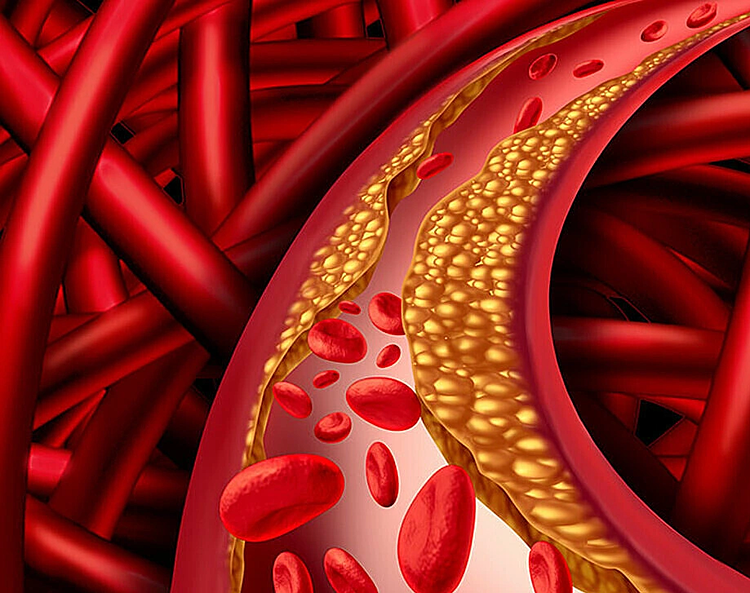"I always believed I was immune to obesity and illness because no matter how much I ate, I never gained weight," Le, from Vinh Phuc, shared. This belief led to a sedentary lifestyle, frequently skipping breakfast, and replacing meals with milk tea, fried foods, and pastries.
During a routine health check in June, Le's test results revealed a cholesterol level of 9.8 mmol/l, double the recommended limit of under 5.1 mmol/l.
In disbelief, Le sought a second opinion. Dr. Doan Du Manh, Deputy Director of Phuong Dong General Hospital and a member of the Vietnam Vascular Disease Association, explained that cholesterol levels aren't directly related to body shape. Harmful cholesterol can silently accumulate in blood vessels even in thin individuals, threatening cardiovascular health and increasing the risk of stroke.
Khoi, 34, presents another case. The sales executive jogs every morning, maintains a toned physique, doesn't smoke or drink alcohol, and limits his carbohydrate intake. However, he regularly consumes red meat and organ meats, believing his exercise routine will "burn off" these foods.
In early July, during a run, Khoi experienced a sharp pain in his left chest that radiated to his arm, accompanied by dizziness and a rapid heartbeat. His cholesterol level was 8.9 mmol/l, and his electrocardiogram (ECG) indicated mild myocardial ischemia, a warning sign for a potential heart attack if his organ-rich diet wasn't immediately addressed.
 |
A doctor examines a patient. Photo: Doctor provided |
A doctor examines a patient. Photo: Doctor provided
Modern medicine refers to cases like Le and Khoi's as MONW (Metabolically Obese Normal Weight). A recent study from Kyungpook National University, South Korea, published in the journal Diabetes & Metabolism, indicates that MONW prevalence is higher in Asia than in the West, ranging from 15-30% of the adult population, with Vietnam at approximately 21%.
A lipid disorder, whether in thin or overweight individuals, refers to abnormal levels of lipids in the blood. This can include elevated levels of bad cholesterol (LDL-C), triglycerides, or reduced levels of good cholesterol (HDL-C). According to the World Health Organization (WHO), high cholesterol contributes to 48% of strokes and 56% of myocardial ischemia cases globally.
In Vietnam, approximately 153,000 people experience lipid disorders annually. A survey by the Ho Chi Minh City Nutrition Center of 700 individuals aged 30-69 with normal BMIs (18.5-25) found that 77.8% had lipid disorders, a concerning statistic highlighting the "hidden" dangers in thin individuals.
Dr. Duong Minh Tuan, from the Department of Endocrinology and Diabetes at Bach Mai Hospital, identifies visceral fat as the primary cause of MONW. Visceral fat accumulates around the liver, intestines, and heart, undetectable to the naked eye. A study published in the Journal of Clinical Endocrinology & Metabolism suggests that Asians tend to have 30-40% more visceral fat than Westerners with the same BMI, Dr. Tuan explained.
In addition to visceral fat, insulin resistance, a condition where the body becomes less responsive to the blood sugar-regulating hormone, causes the liver to increase fat production, raising triglyceride levels and leading to fatty liver disease. This process can occur silently for years without noticeable symptoms. Other factors include genetics, consumption of hidden sugars, endocrine disorders, chronic stress, and an imbalance in gut bacteria.
"Many believe a normal BMI equates to good health, but studies from the University of Tokyo reveal that individuals with MONW have a 30% higher risk of cardiovascular issues compared to those with the same BMI but normal metabolism," Dr. Manh warned. A 2024 meta-analysis published in the Journal of American Heart Association found a 50% increased risk of cardiovascular-related death in individuals with MONW compared to those with a healthy weight and metabolism.
 |
Illustration of cholesterol buildup in the blood. Image: My Health My Life |
Illustration of cholesterol buildup in the blood. Image: My Health My Life
Managing underlying conditions like high blood pressure and cholesterol is crucial for preventing stroke and heart attack. A 15-year Harvard University study of 27,000 participants indicated that effectively controlling cholesterol levels can reduce the risk of stroke by 40% and heart attack by 35%, regardless of weight.
For individuals like Le and Khoi, lifestyle changes are the first and most important step. This includes a diet rich in vegetables and fresh fruit, limiting salt and saturated fat; daily exercise; stress management; and regular health checks, especially cholesterol screenings, even without outward signs of obesity.
Thuy Quynh












